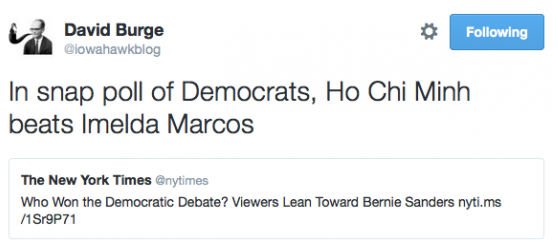From Kevin D. Williamson:
In lieu of the usual complex regulation larded with special-interest favoritism, here is a simple mortgage rule that could and probably should be adopted: No federally regulated financial institution shall make a mortgage loan without the borrower’s making a down payment of at least 20 percent derived from his own savings.
Period, paragraph, next subject.
Instead of doing that, we are sprinting flat-out in the opposite direction, with government-sponsored mortgage giant Fannie Mae rolling out a daft new mortgage proposal that would allow borrowers without enough income to qualify for a mortgage to count income that isn’t theirs on their mortgage application.
The Committee to Re-Inflate the Bubble strikes again: We’ve just legalized mortgage fraud.
Claiming that the money you are using for a down payment is yours when it has been lent to you by a family member or a friend was a crime, too. (A felony, in fact; a whole subplot in The Wire was based on that crime.) There is a reason for this: People who have saved up enough for a down payment on a house are very different kinds of borrowers from people who haven’t, and people whose mortgage debt is two times their annual income are different kinds of borrowers from those with mortgages that are eight times their income. One sort of borrower is a great deal more likely to default than the other sort — and, as we learned a few years back, mortgage default can, under certain circumstances, turn out to be everybody’s problem rather than a problem limited to the jackasses who write low-quality mortgages.
But Fannie Mae, the organized-crime syndicate masquerading as a quasi-governmental entity, has other ideas. Under its new and cynically misnamed “HomeReady” program, borrowers with subprime credit don’t need to show that they have enough income to qualify for the mortgage they’re after — they simply have to show that all the people residing in their household put together have enough income to qualify for that mortgage. We’re not talking just about husbands and wives here, but any group of people who happen to share a roof and a mailing address. And some non-residents can be added, too, such as your parents.
That would be one thing if all these people were applying for a mortgage together, and were jointly on the hook for the mortgage payments. But that isn’t the case. HomeReady will permit borrowers to claim other people’s income for the purpose for qualifying for a mortgage, but will not give mortgage lenders any actual claim against that additional income.
This is madness.
But mortgage madness is very much the order of the day. Groups such as the National Association of Realtors — the ninth-largest campaign donor, second-largest spender on lobbying, and 13th-largest source of outside spending dollars — have a strong economic interest in seeing as many house sales as possible — that’s where commissions come from — and that means insanely easy mortgage terms, regardless of the consequences.
In this case, there is also an immigration angle. As Investors Business Daily reports: “It’s all part of a government campaign to ease access to home loans for Hispanic immigrants, who tend to live in groups and pool finances. . . . The National Association of Hispanic Real Estate Professionals, a liberal trade group, is praising the move, arguing it will bring tens of thousands of Hispanic families into the home market who have been ‘skipped over’ by stingy (meaning prudent and responsible) lenders.”
And the down payments? Try 3 percent — i.e., squat.
Homeownership isn’t right for everybody. For one thing, enormous debt isn’t right for everybody, and homeownership without equity (3 percent, indeed) is nothing more than that. What’s more, as National Review’s Reihan Salam has shown, the social benefits associated with homeownership — stability, civic engagement, etc. — are present only when there is significant equity held. As Salam and co-author Christopher Papagianis put it: “The traits that enabled households to build up the savings necessary for significant down payments — hard work and the deferral of gratification — were misattributed to homeownership itself.”
Which is to say: Getting people without a ceramic vessel in which to engage in regular micturition nor the down payment and good credit to finance said vessel does not magically turn them into Ward and June Cleaver: It just makes them people who have added a huge new debt to their already-terrible finances. That isn’t so bad at times when house prices increase at a rate that outpaces the return on other investments, but that can go on for only so long. In reality — the reality that bit us on the hindquarters back in 2008 — the prices of houses, like the prices of widgets and lawn furniture and Picassos and aviation fuel and everything else, go up and down.
And when they go down, who is going to default? The guy who has put up 20 percent on a house that costs two times what he makes in a year, or the guy who has put up 3 percent on a house that costs 2.5 times what he, his wife, his parents, his uncle, his three spinster aunts, his son with the part-time job at Burger King, and that weird guy Bob who sometimes sleeps in the basement — all of them together — earn in a year?
All these years after the mortgage meltdown, we still don’t have sensible regulation of mortgage lending. We desperately need that. We also need to kill Fannie Mae and Freddie Mac, the Axis of Subprime Evil. And we need to do that before the next financial crisis is upon us, not in the middle of a new financial crisis.


